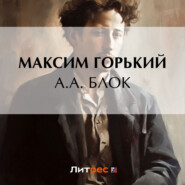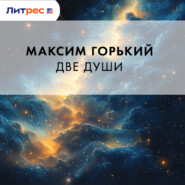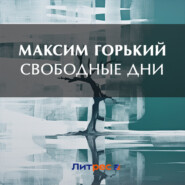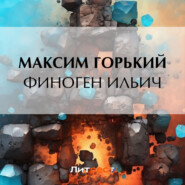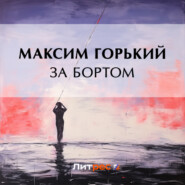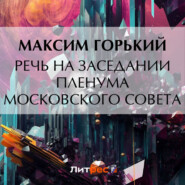По всем вопросам обращайтесь на: info@litportal.ru
(©) 2003-2025.
✖
Mother
Настройки чтения
Размер шрифта
Высота строк
Поля
Two peasants gave vent to hard oaths.
"Look out, boys!" a somewhat subdued cry was heard in warning.
The commissioner of police walked into the crowd – a tall, compact man, with a round, red face. His cap was cocked to one side; his mustache with one end turned up the other drooping made his face seem crooked, and it was disfigured by a dull, dead grin. His left hand held a saber, his right waved broadly in the air. His heavy, firm tramp was audible. The crowd gave way before him. Something sullen and crushed appeared in their faces, and the noise died away as if it had sunk into the ground.
"What's the trouble?" asked the police commissioner, stopping in front of Rybin and measuring him with his eyes. "Why are his hands not bound? Officers, why? Bind them!" His voice was high and resonant, but colorless.
"They were tied, but the people unbound them," answered one of the policemen.
"The people! What people?" The police commissioner looked at the crowd standing in a half-circle before him. In the same monotonous, blank voice, neither elevating nor lowering it, he continued: "Who are the people?"
With a back stroke he thrust the handle of his saber against the breast of the blue-eyed peasant.
"Are you the people, Chumakov? Well, who else? You, Mishin?" and he pulled somebody's beard with his right hand.
"Disperse, you curs!"
Neither his voice nor face displayed the least agitation or threat. He spoke mechanically, with a dead calm, and with even movements of his strong, long hands, pushed the people back. The semicircle before him widened. Heads drooped, faces were turned aside.
"Well," he addressed the policeman, "what's the matter with you? Bind him!" He uttered a cynical oath and again looked at Rybin, and said nonchalantly: "Your hands behind your back, you!"
"I don't want my hands to be bound," said Rybin. "I'm not going to run away, and I'm not fighting. Why should my hands be bound?"
"What?" exclaimed the police commissioner, striding up to him.
"It's enough that you torture the people, you beasts!" continued Rybin in an elevated voice. "The red day will soon come for you, too. You'll be paid back for everything."
The police commissioner stood before him, his mustached upper lip twitching. Then he drew back a step, and with a whistling voice sang out in surprise:
"Um! you damned scoundrel! Wha-at? What do you mean by your words? People, you say? A-a – "
Suddenly he dealt Rybin a quick, sharp blow in the face.
"You won't kill the truth with your fist!" shouted Rybin, drawing on him. "And you have no right to beat me, you dog!"
"I won't dare, I suppose?" the police commissioner drawled.
Again he waved his hand, aiming at Rybin's head; Rybin ducked; the blow missed, and the police commissioner almost toppled over. Some one in the crowd gave a jeering snort, and the angry shout of Mikhaïl was heard:
"Don't you dare to beat me, I say, you infernal devil! I'm no weaker than you! Look out!"
The police commissioner looked around. The people shut down on him in a narrower circle, advancing sullenly.
"Nikita!" the police commissioner called out, looking around. "Nikita, hey!" A squat peasant in a short fur overcoat emerged from the crowd. He looked on the ground, with his large disheveled head drooping.
"Nikita," the police commissioner said deliberately, twirling his mustache, "give him a box on the ear – a good one!"
The peasant stepped forward, stopped in front of Rybin and raised his hand. Staring him straight in the face, Rybin stammered out heavily:
"Now look, people, how the beasts choke you with your own hands! Look! Look! Think! Why does he want to beat me – why? I ask."
The peasant raised his hand and lazily struck Mikhaïl's face.
"Ah, Nikita! don't forget God!" subdued shouts came from the crowd.
"Strike, I say!" shouted the police commissioner, pushing the peasant on the back of his neck.
The peasant stepped aside, and inclining his head, said sullenly:
"I won't do it again."
"What?" The face of the police commissioner quivered. He stamped his feet, and, cursing, suddenly flung himself upon Rybin. The blow whizzed through the air; Rybin staggered and waved his arms; with the second blow the police commissioner felled him to the ground, and, jumping around with a growl, he began to kick him on his breast, his side, and his head.
The crowd set up a hostile hum, rocked, and advanced upon the police commissioner. He noticed it and jumped away, snatching his saber from its scabbard.
"So that's what you're up to! You're rioting, are you?"
His voice trembled and broke; it had grown husky. And he lost his composure along with his voice. He drew his shoulders up about his head, bent over, and turning his blank, bright eyes on all sides, he fell back, carefully feeling the ground behind him with his feet. As he withdrew he shouted hoarsely in great excitement:
"All right; take him! I'm leaving! But now, do you know, you cursed dogs, that he is a political criminal; that he is going against our Czar; that he stirs up riots – do you know it? – against the Emperor, the Czar? And you protect him; you, too, are rebels. Aha – a – "
Without budging, without moving her eyes, the strength of reason gone from her, the mother stood as if in a heavy sleep, overwhelmed by fear and pity. The outraged, sullen, wrathful shouts of the people buzzed like bees in her head.
"If he has done something wrong, lead him to court."
"And don't beat him!"
"Forgive him, your Honor!"
"Now, really, what does it mean? Without any law whatever!"
"Why, is it possible? If they begin to beat everybody that way, what'll happen then?"
"The devils! Our torturers!"
The people fell into two groups – the one surrounding the police commissioner shouted and exhorted him; the other, less numerous, remained about the beaten man, humming and sullen. Several men lifted him from the ground. The policemen again wanted to bind his hands.
"Wait a little while, you devils!" the people shouted.
Rybin wiped the blood from his face and beard and looked about in silence. His gaze glided by the face of the mother. She started, stretched herself out to him, and instinctively waved her hand. He turned away; but in a few minutes his eyes again rested on her face. It seemed to her that he straightened himself and raised his head, that his blood-covered cheeks quivered.
"Did he recognize me? I wonder if he did?"
She nodded her head to him and started with a sorrowful, painful joy. But the next moment she saw that the blue-eyed peasant was standing near him and also looking at her. His gaze awakened her to the consciousness of the risk she was running.
"What am I doing? They'll take me, too."
The peasant said something to Rybin, who shook his head.
"Look out, boys!" a somewhat subdued cry was heard in warning.
The commissioner of police walked into the crowd – a tall, compact man, with a round, red face. His cap was cocked to one side; his mustache with one end turned up the other drooping made his face seem crooked, and it was disfigured by a dull, dead grin. His left hand held a saber, his right waved broadly in the air. His heavy, firm tramp was audible. The crowd gave way before him. Something sullen and crushed appeared in their faces, and the noise died away as if it had sunk into the ground.
"What's the trouble?" asked the police commissioner, stopping in front of Rybin and measuring him with his eyes. "Why are his hands not bound? Officers, why? Bind them!" His voice was high and resonant, but colorless.
"They were tied, but the people unbound them," answered one of the policemen.
"The people! What people?" The police commissioner looked at the crowd standing in a half-circle before him. In the same monotonous, blank voice, neither elevating nor lowering it, he continued: "Who are the people?"
With a back stroke he thrust the handle of his saber against the breast of the blue-eyed peasant.
"Are you the people, Chumakov? Well, who else? You, Mishin?" and he pulled somebody's beard with his right hand.
"Disperse, you curs!"
Neither his voice nor face displayed the least agitation or threat. He spoke mechanically, with a dead calm, and with even movements of his strong, long hands, pushed the people back. The semicircle before him widened. Heads drooped, faces were turned aside.
"Well," he addressed the policeman, "what's the matter with you? Bind him!" He uttered a cynical oath and again looked at Rybin, and said nonchalantly: "Your hands behind your back, you!"
"I don't want my hands to be bound," said Rybin. "I'm not going to run away, and I'm not fighting. Why should my hands be bound?"
"What?" exclaimed the police commissioner, striding up to him.
"It's enough that you torture the people, you beasts!" continued Rybin in an elevated voice. "The red day will soon come for you, too. You'll be paid back for everything."
The police commissioner stood before him, his mustached upper lip twitching. Then he drew back a step, and with a whistling voice sang out in surprise:
"Um! you damned scoundrel! Wha-at? What do you mean by your words? People, you say? A-a – "
Suddenly he dealt Rybin a quick, sharp blow in the face.
"You won't kill the truth with your fist!" shouted Rybin, drawing on him. "And you have no right to beat me, you dog!"
"I won't dare, I suppose?" the police commissioner drawled.
Again he waved his hand, aiming at Rybin's head; Rybin ducked; the blow missed, and the police commissioner almost toppled over. Some one in the crowd gave a jeering snort, and the angry shout of Mikhaïl was heard:
"Don't you dare to beat me, I say, you infernal devil! I'm no weaker than you! Look out!"
The police commissioner looked around. The people shut down on him in a narrower circle, advancing sullenly.
"Nikita!" the police commissioner called out, looking around. "Nikita, hey!" A squat peasant in a short fur overcoat emerged from the crowd. He looked on the ground, with his large disheveled head drooping.
"Nikita," the police commissioner said deliberately, twirling his mustache, "give him a box on the ear – a good one!"
The peasant stepped forward, stopped in front of Rybin and raised his hand. Staring him straight in the face, Rybin stammered out heavily:
"Now look, people, how the beasts choke you with your own hands! Look! Look! Think! Why does he want to beat me – why? I ask."
The peasant raised his hand and lazily struck Mikhaïl's face.
"Ah, Nikita! don't forget God!" subdued shouts came from the crowd.
"Strike, I say!" shouted the police commissioner, pushing the peasant on the back of his neck.
The peasant stepped aside, and inclining his head, said sullenly:
"I won't do it again."
"What?" The face of the police commissioner quivered. He stamped his feet, and, cursing, suddenly flung himself upon Rybin. The blow whizzed through the air; Rybin staggered and waved his arms; with the second blow the police commissioner felled him to the ground, and, jumping around with a growl, he began to kick him on his breast, his side, and his head.
The crowd set up a hostile hum, rocked, and advanced upon the police commissioner. He noticed it and jumped away, snatching his saber from its scabbard.
"So that's what you're up to! You're rioting, are you?"
His voice trembled and broke; it had grown husky. And he lost his composure along with his voice. He drew his shoulders up about his head, bent over, and turning his blank, bright eyes on all sides, he fell back, carefully feeling the ground behind him with his feet. As he withdrew he shouted hoarsely in great excitement:
"All right; take him! I'm leaving! But now, do you know, you cursed dogs, that he is a political criminal; that he is going against our Czar; that he stirs up riots – do you know it? – against the Emperor, the Czar? And you protect him; you, too, are rebels. Aha – a – "
Without budging, without moving her eyes, the strength of reason gone from her, the mother stood as if in a heavy sleep, overwhelmed by fear and pity. The outraged, sullen, wrathful shouts of the people buzzed like bees in her head.
"If he has done something wrong, lead him to court."
"And don't beat him!"
"Forgive him, your Honor!"
"Now, really, what does it mean? Without any law whatever!"
"Why, is it possible? If they begin to beat everybody that way, what'll happen then?"
"The devils! Our torturers!"
The people fell into two groups – the one surrounding the police commissioner shouted and exhorted him; the other, less numerous, remained about the beaten man, humming and sullen. Several men lifted him from the ground. The policemen again wanted to bind his hands.
"Wait a little while, you devils!" the people shouted.
Rybin wiped the blood from his face and beard and looked about in silence. His gaze glided by the face of the mother. She started, stretched herself out to him, and instinctively waved her hand. He turned away; but in a few minutes his eyes again rested on her face. It seemed to her that he straightened himself and raised his head, that his blood-covered cheeks quivered.
"Did he recognize me? I wonder if he did?"
She nodded her head to him and started with a sorrowful, painful joy. But the next moment she saw that the blue-eyed peasant was standing near him and also looking at her. His gaze awakened her to the consciousness of the risk she was running.
"What am I doing? They'll take me, too."
The peasant said something to Rybin, who shook his head.












